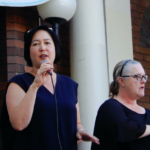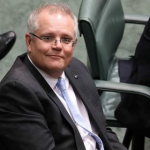Instead of Rights for All, Morrison Is Pushing for a “Christian Bill of Rights”

The second wave of COVID-19 with its accompanying lockdowns has brought rights issues to the fore. But while many are questioning whether rights to movement and association are being undermined, the truth is there’s no federal law guaranteeing most human rights in this country.
Australia continues to be the only western liberal democracy without legislation enshrining citizens’ rights in law. And a bill of rights, or as the Human Rights Law Centre terms it, an Australian Charter of Rights and Freedoms, would provide citizens with a set of rights they could be sure of.
However, amidst all the current confusion and dispute around pandemic restrictions, down in Canberra the Attorney General’s Department is busy producing the third draft of the Religious Discrimination Bill, or as federal Liberal MP Warren Entsch has labelled it, a “Christian bill of rights”.
PM Scott Morrison began spruiking such a bill just days after marriage equality was legalised. Prior to the passing of these laws, the conservative Christian Right had already initiated the “religious freedoms” debate, but with the right to marriage extended to LGBTIQ people, they stepped it up.
The issues related to a lack of rights protections are well understood. Yet, governments are reluctant to enact a rights bill as it serves to stymie their power. And instead of moving to guarantee the rights of all, the current PM is determined to simply uphold the rights of those who think like him.
Upholding the rights of all
“Governments have to make agonising decisions in this pandemic about how to protect people’s lives and health, whilst not unnecessarily restricting other human rights,” explained Hugh de Kretser, the executive director of the Human Rights Law Centre.
“That’s easy to say and hard to do,” he told Sydney Criminal Lawyers. “What a charter does is it gives governments a compass to make the right decisions in those difficult circumstances.”

The Human Rights Legal Centre has long been campaigning for an Australian Charter of Rights. It terms it a charter rather than a bill to make it distinct from the US experience, which involves a bill of rights having been inserted into its constitution back in the late 18th century.
The Australian Charter of Rights would be a standalone statutory piece of legislation, which would outline the rights guaranteed under federal law, and protect against infringements made upon them by the state or individuals.
So, with such a charter in place, laws and policies that violate basic human rights could be challenged and made void.
“Without a charter there is a great chance that governments will make the wrong decisions and, certainly, people will lack the power to challenge those decisions when governments overreach and get it wrong,” de Kretser advised.
For the blessed few
The first two drafts of the Religious Discrimination Bill (RD Bill) were released in late 2019. The second draft was prioritised in the midst of the nation’s greatest bushfire crisis. And current attorney general Michaelia Cash has indicated that the third draft will be released by December this year.
Whist it’s being presented as an anti-discrimination bill to protect those of faith against prejudicial treatment because of their religious beliefs, the scope of the laws go further so as to provide those who follow a religious doctrine with the right to discriminate against others in the name of it.
“People should be protected from discrimination on the grounds of their religion,” de Kretser made certain. “But that needs to be done as part of a broad-based protection of all human rights, not a selective preferencing of one human right over another.”
The lawyer added that within the first two drafts there were many provisions that adhered to standard anti-discrimination law.
“But unfortunately, there were a number of controversial provisions that unreasonably preference protection of faith over other human rights,” he added. “In particular the rights of LGBTIQ communities and the rights of woman.”
The second draft of the RD Bill contains the health practitioner conduct rule, which permits a professional to refuse particular medical care to a patient if it doesn’t agree with their faith. Indeed, the patient’s treatment requirement is classed as indirect discrimination against a doctor.
Another controversial provision is the so-called “Folau’s clause”, which prevents larger employers from taking action against employees who make discriminatory remarks in the name of their faith, similar to the way Rugby Australia sacked Israel Folau for his online condemnation of gay people.
A shield and not a sword
A number of federal Coalition MPs, led by Dave Sharma, met with the attorney general in late June to discuss their grievances with the initial drafts of the RD Bill, telling Cash that if the third draft continues to contain provisions like Folau’s clause, they won’t be supporting its passage.
According to de Kretser, regardless of amendments, the RD Bill isn’t the way to go. “What we’ve seen recently is reinforcing the need for a charter of human rights that comprehensively protects human rights at the national level,” he said.
The lawyer outlined that the RD Bill isn’t the only instance where an “imbalance” with the upholding and protection of rights has been exposed. He pointed to the Royal Commissions into age care, youth detention and mental health as revealing these types of disparities.
Australia, as a nation, has ratified all seven core global human rights treaties, which means our government has committed to the upholding of the rights contained within these documents at the international level, but this doesn’t carry over to the domestic sphere.
De Kretser maintains that a federal rights charter should be enacted that protects the rights within the treaties, and it should further provide a mechanism to deal with rights when they “from time to time” come into conflict.
As an example, he gave the current debate around “freedom of expression and public health”.
This mechanism should resolve “those conflicts in a way which promotes both of those rights to the greatest extent possible, while recognising that there needs to be reasonable limitation on some rights”, he concluded.







